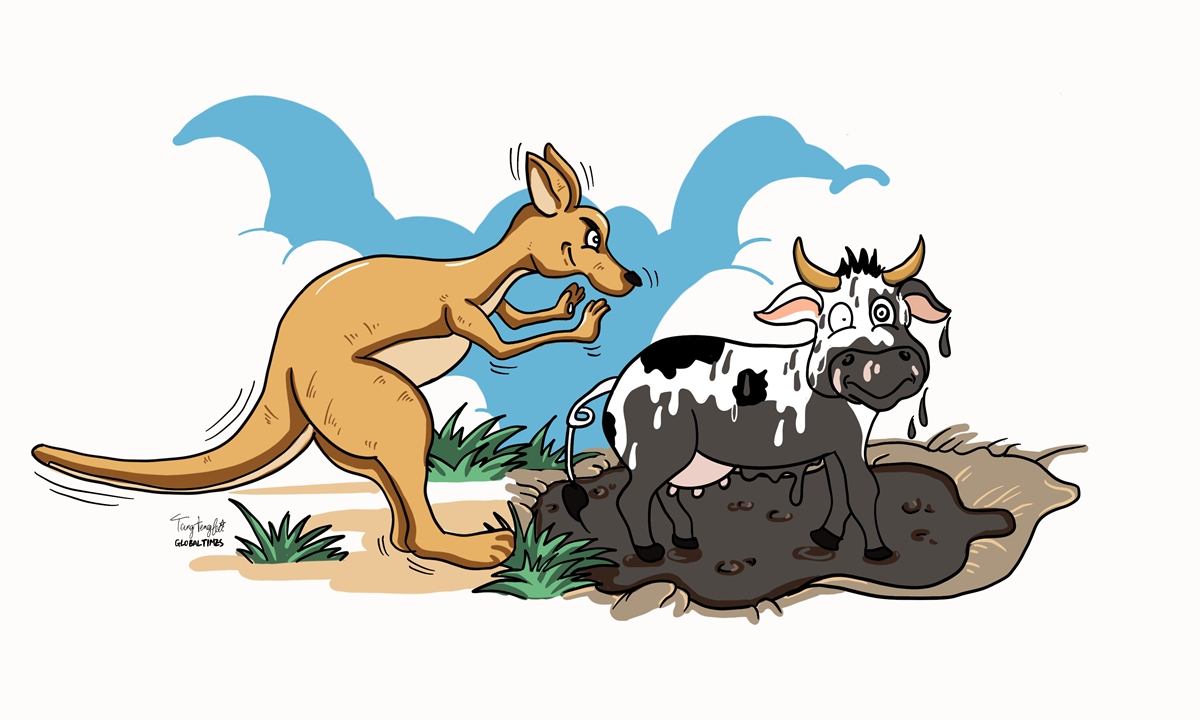Aussie farmers could be sacrificed under US coercion
By Yu Lei Source: Global Times Published: 2020/9/8 19:54:00

Illustration: Tang Tengfei/GT
After months of reckless attempts to smear China amid the deadly COVID-19 pandemic, Australia witnessed its first recession in nearly 30 years. Its farm sector, with a large population, has seen confidence continue to slide as the pandemic spreads and international market concerns grow.
The mounting discontent among Aussie farmers would bring in more weight on Canberra, however, it may not be sufficient enough for the Morrison administration to redress its diplomatic policies, and farmers' interest may be one to sacrifice amid the irresistible pressure on Canberra from Washington.
According to the latest quarterly survey released by Rabobank on Monday, Aussie farmers' confidence has continued a downward trend, from a nearly five-year record high at the beginning the year.
Among the respondents in South Australia, 42 percent are anticipating a worsening of business conditions in the coming 12 months, up from 19 percent in the previous quarter. The state of overseas markets proved the greatest concern, cited by 61 percent of the pessimistic farmers, the survey revealed.
The agricultural sector in Australia has been relying heavily on the international market, with nearly two-thirds of its products being exported. China, Australia's largest trading partner, has been a top consumer of its agricultural products as well.
"Almost one in three export dollars to the [agriculture] industry is earned from China," local news outlet ABC reported, citing Rabobank analyst Tim Hunt.
Despite the close ties between Aussie farmers and the Chinese market, Canberra has chosen to ignore the interest of its farmers and follow the heels of the US government to encircle and contain China. Its rising animosity toward China has sparked anger among Chinese consumers.
Meanwhile, the Aussie agricultural sector has been under the US bullying for decades due to its homogeneity with the American agricultural sector.
Although the Chinese market is crucial for Aussie farmers, the trading volume of the sector has accounted for a relatively small proportion of the entire bilateral trade, compared to iron ore.
With iron ore remaining as a major export of Australia to China, Canberra may further ignore the deteriorating prospect of its farm sector. In the past decades, it has enjoyed healthy growth alongside China's rapid growth which generated surging demand for Aussie resources. However, the opportunity wouldn't persist forever.
The overall bilateral trade remained robust during the first half of the year, but it has shown a sliding trend recently. Australia's exports to China slumped by nearly a quarter year-on-year and a fifth month-on-month to reach 61.76 billion yuan ($9.04 billion) in August, according to statistics released by China's General Administration of Customs.
And per data from the Australian Bureau of Statistics, Australia's iron ore exports to China dropped 12 percent month-on-month in July, while China expanded imports of iron ore from India and Brazil during the same period.
The growth of the bilateral trade may keep dropping. And amid the US' coercive polices, agricultural exports of Australia may continue to decline.
The author is a chair professor at the Research Center for Pacific Island Countries, Liaocheng University. bizopinion@globaltimes.com.cn
Posted in: EXPERT ASSESSMENT